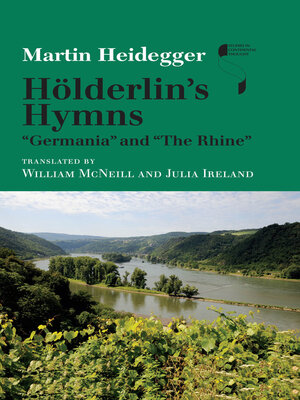Hölderlin's Hymns
ebook ∣ "Germania" and "The Rhine" · Studies in Continental Thought
By Martin Heidegger

Sign up to save your library
With an OverDrive account, you can save your favorite libraries for at-a-glance information about availability. Find out more about OverDrive accounts.
Find this title in Libby, the library reading app by OverDrive.



Search for a digital library with this title
Title found at these libraries:
| Library Name | Distance |
|---|---|
| Loading... |
"Translated with skill and precision, these lectures . . . present the most penetrating analysis of two of Hölderlin's most significant hymns" (Choice).
Martin Heidegger's 1934–1935 lectures on Friedrich Hölderlin's hymns "Germania" and "The Rhine" are considered the most significant among Heidegger's lectures on Hölderlin. Coming at a crucial time in his career, the text illustrates Heidegger's turn toward language, art, and poetry while reflecting his despair at his failure to revolutionize the German university and his hope for a more profound revolution through the German language, guided by Hölderlin's poetry.
These lectures are important for understanding Heidegger's changing relation to politics, his turn toward Nietzsche, his thinking about the German language, and his breakthrough to a new kind of poetic thinking.
"[This translation], including a clear and concise introduction and useful glossaries, attains both accuracy and clarity, rarely faltering in its choice of words." —Notre Dame Philosophical Reviews
Martin Heidegger's 1934–1935 lectures on Friedrich Hölderlin's hymns "Germania" and "The Rhine" are considered the most significant among Heidegger's lectures on Hölderlin. Coming at a crucial time in his career, the text illustrates Heidegger's turn toward language, art, and poetry while reflecting his despair at his failure to revolutionize the German university and his hope for a more profound revolution through the German language, guided by Hölderlin's poetry.
These lectures are important for understanding Heidegger's changing relation to politics, his turn toward Nietzsche, his thinking about the German language, and his breakthrough to a new kind of poetic thinking.
"[This translation], including a clear and concise introduction and useful glossaries, attains both accuracy and clarity, rarely faltering in its choice of words." —Notre Dame Philosophical Reviews







